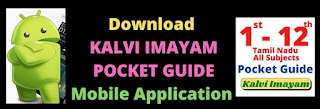Dear Teachers Send Your Study Materials, Question Papers & Answers to kalvisri.education@gmail.com
Join Our Whatsapp Group Click Here
9th Social Science Civics Assignment Answers TN SCERT
9th Social Science Civics Assignment Answers. 9th Standard TN SCERT Assignment Answers, 9th Social Civics Unit 1 TN SCERT Answer key 2021. 9th Standard All Subject TN SCERT Assignment Unit 1 Answers. TN SCERT Announced 1st to 12th All Subject Assignment Worksheets for Unit 1. Students Can Note that 9th Social Science Economics Unit 1 TNSCERT Assignment. 9th Tamil Assignment Answers, 9th Tamil Assignment Answers download PDF. 9th Maths Assignment Answers Unit 1 TNSCER Tamil Medium and English Medium.
Click Here to Download KALVI IMAYAM POCKET GUIDE Mobile Application
9th Assignment Answers TN SCERT
9th Social Science-Civics Assignment Answer 2021
- Class : 9
- Subject : Social Science | CIVICS
- Unit 1- Forms Of Government And Democracy
Part - A
I. CHOOSE THE BEST ANSWER:
1. A system of government in which one person reigns supreme, usually a King or Queen is Called.
a) Autocracy
b) Monarchy
c) Demoracy
d) Republic
2. A system of government with absolute power
a) Aristocracy
b) Theocracy
c) Democracy
d) Autocracy
3. Select the Odd one.
a) India
b) U S A
c) France
d) Vatican
4. Kudavolai system was followed by
a) Cheras
b) Pandyas
c) Cholas
d) Kalaphras
5.From which language was the term ‘Democracy’ derived?
a) Greek
b) Latin
c) Persia
d) Arabia
II. Give Short Answer:
Part - B
1. Give Abraham Lincoln’s definition for Democracy.
Answer:
- Abraham Lincoln defines democracy as a government of the people, by the people and for the people.
2. Mention the forms of Democracy.
3. Distinguish between Direct and Indirect Democracy.
Direct democracy
When the people themselves directly express their will on public affairs, the type of government is called pure or direct democracy.
e.g., Ancient Greek city-states, Switzerland
Indirect democracy
When the people express their will on public affairs, through their elected representatives, the type of government is called indirect or representative democracy.
e.g., The prevailing system of democracy in India, USA and UK
III. Answer in Detail:
Part - C
1. What are the challenges to Indian Democracy? Explain.
- Though democracy in India has been appreciated worldwide for its working, there is still a lot of scope for improvement. The above-mentioned steps must be taken to ensure smooth functioning of democracy in the country.
- Indian democracy can be successful and vibrant only when its citizens imbibe and reflect in their behavior the basic democratic values like equality, freedom, social justice, accountability and respect for all. Their mindset, thinking and behavior are expected to be in tune with the essential conditions of democracy. They have to appreciate the opportunities for their desired roles like participation, making the system accountable, fulfilling obligations, and playing proactive roles to actualize the goals of democracy.
2. What is your opinion about Indian Democracy?
- India has a parliamentary form of democracy. The Indian Parliament comprises the elected representatives of people and makes the laws for the Country. The participation of people in the decision making and the consent of citizens are the two important elements of the parliamentary form of government in India.
- India is the largest democratic country in the world. Democracy in India works on five basic principles. These are sovereign, socialist, secular, democratic, republic.
- Every person who is a citizen of India and who is not less than 18 years of age can exercise their right to vote in India, based on universal adult suffrage. There is no discrimination based on a person’s caste, creed, religion, region, gender and education when it comes to providing the right to vote.








வாசகர்களின் கருத்துக்களை அன்புடன் வரவேற்கின்றோம்.